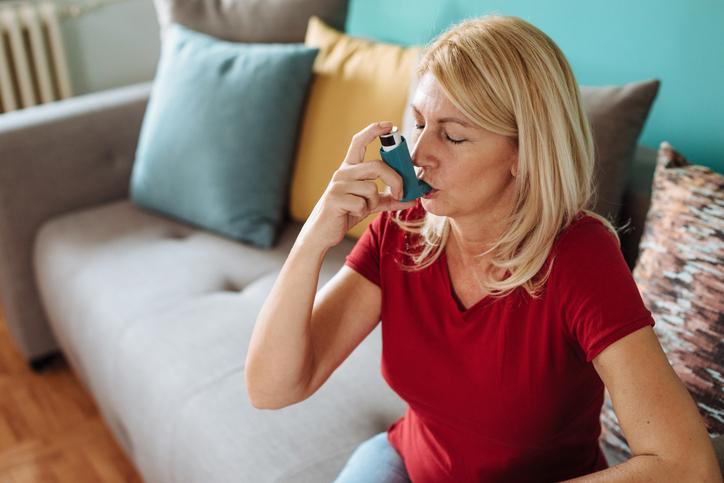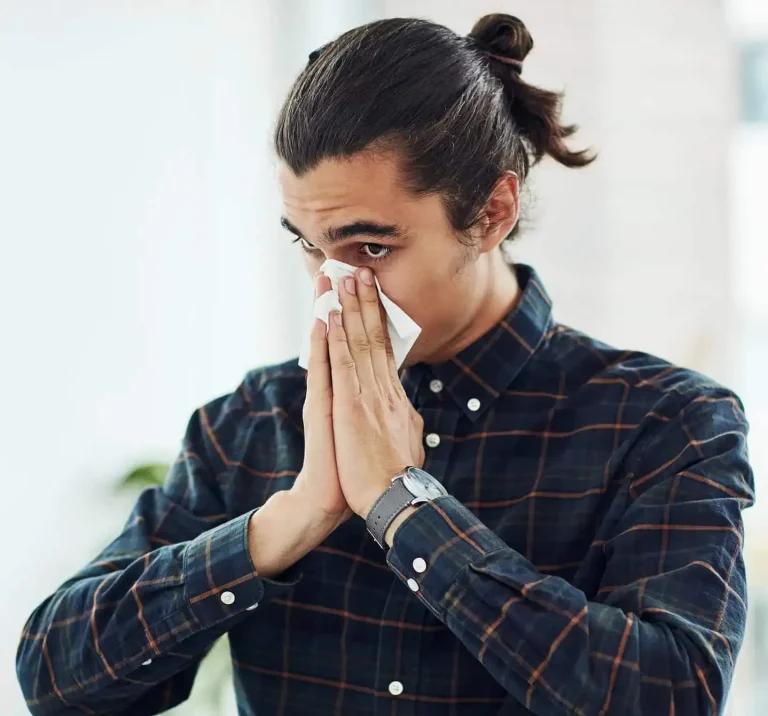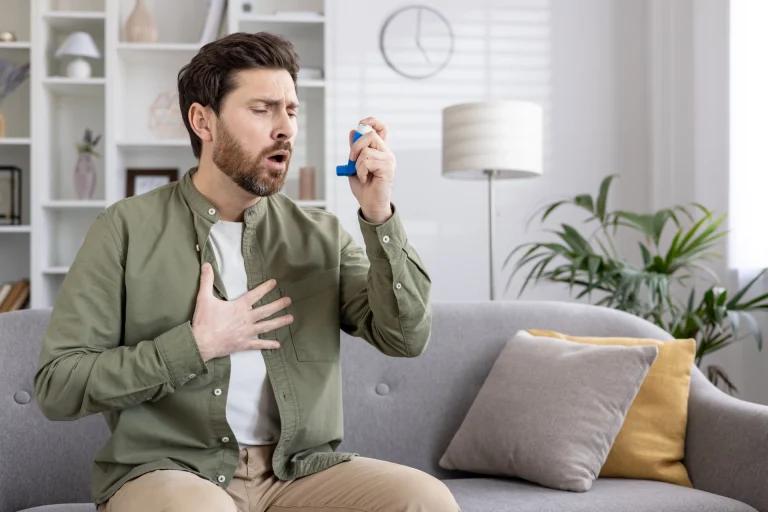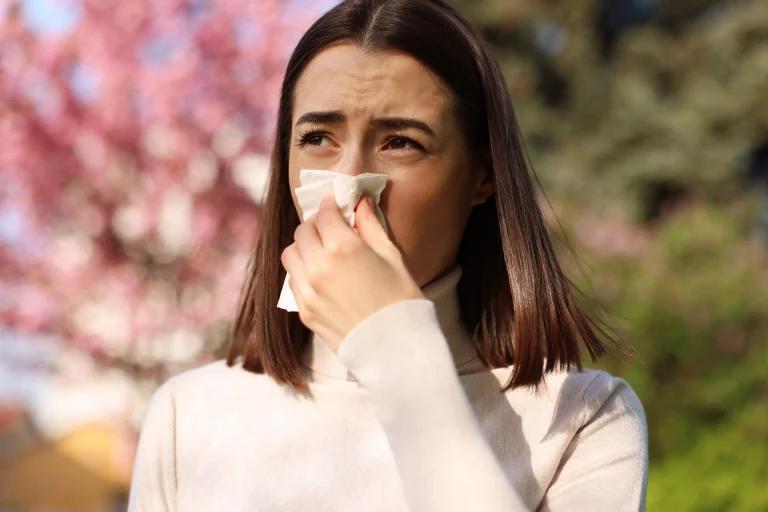
If you have asthma, there’s a good chance you might also be allergic to something. In fact, most people with asthma are also allergic to something. So what is allergic asthma? How do you know if you have it? And what can you do about it? Keep reading to find out.
Allergic asthma is a condition in which the airways become inflamed and constricted in response to allergens. Allergens are harmless substances that trigger an immune response in some people. When an allergic person inhales allergens, the immune system mounts a response, releasing histamine and other chemicals that lead to the symptoms of asthma.
In people with asthma, this response is exaggerated, leading to inflammation of the airways and difficulty breathing. Allergic asthma can be triggered by a variety of allergens, common allergens include:
- Pollen
- Mould
- House dust mites faeces, saliva and body parts of these insects
- Pet dander
- Cockroach faeces, saliva and body parts of these insects
- Rodents
In a small number of people, food can cause an asthmatic reaction. Common food allergy triggers include:
- Milk
- Shellfish
- Eggs
- Peanuts
It is important to note allergens aren’t the only thing that can make your allergic asthma worse. Irritants can be an asthma trigger also even though they don’t cause an allergic reaction. This type of asthma is known as non-allergic asthma. Irritants include:
- Air pollution
- Cold air
- Tobacco smoke
- Exercise
- Strong chemicals
- Perfumes, air fresheners, or other scented products
- Dusty rooms
- Fireplace smoke
- Candles smoke
- Incense sticks smoke
- Firework smoke
Atopic dermatitis, eczema and hay fever are commonly seen in people who also suffer from allergic asthma. The best possible method to manage allergic asthma is to avoid exposure to allergens as much as possible. An asthma specialist, such as an allergist/immunologist is often able to identify the cause of asthma and find a way for their patient’s symptoms to be relieved through avoidance, medication or both.
What happens in the body during allergic asthma ?
When someone has asthma, their immune system starts to produce an excess of antibodies called immunoglobulin E (IgE) when exposed to a sensitive allergens. This can then release other substances that cause inflammation in the airways. The airways become smaller and more difficult to breathe bringing on an asthma attack or even a severe asthma attack. Allergy symptoms can be extremely serious and life-threatening, leading to anaphylaxis and emergency medical help.
What are the symptoms of allergic asthma ?
People with allergic asthma are at risk of experiencing the same symptoms as other types of asthma. The difference is that their triggers can be allergies, which cause an immediate response from your body and may also include additional signs or symptoms linked directly to this condition such as hay fever-type reactions in addition to respiratory issues caused by allergens themselves.
Symptoms of asthma symptoms include:
- Wheezing
- Coughing
- Chest tightness
- Rapid breathing
- Shortness of breath
Hay fever (allergic rhinitis) or skin allergies may present with the following symptoms:
- Itchy skin
- Rash
- Runny nose
- Itchy eyes
- Watery eyes
How do you test for allergic asthma ?
Allergy testing
Skin pricks are a common way to check for allergies. Your doctor will poke your skin with a needle containing an allergen. After 15 minutes the doctor will check whether you have any signs of an allergic reaction including redness or discolouration along with swelling and itching. You might also experience wheals – these are raised bumps that are harmless but an indication that there’s been some response from the immune system against what was applied on site. Blood tests may also be used when skin tests can’t be performed.
Additional lung function tests may be conducted before determining if you need treatment options such as medications called bronchodilators which improve airflow by easing tightness in small muscles near the opening of the airways.
Lung function tests are used by doctors to measure how well your lungs work. These include:
- Spirometry – looks for narrowing in the lungs due to asthma, but it isn’t able to diagnose this condition on its own. You blow into a mouthpiece that is connected to a device or computer
- Peak flow – is useful because of its simplicity. Just breathe out as hard as possible and the measurement of air pressure can be used to track your condition. Home handheld devices allow you to do this at home without having any sessions with a professional
- FeNO test – A FeNO test measures your level of nitric oxide. To take the test, you breathe into a machine. The amount of nitric oxide in your breath can indicate the amount of inflammation and whether you have asthma
- A provocation test – is a crucial step in diagnosing asthma. It tells your doctor how sensitive your lungs are to certain triggers and helps confirm a diagnosis of the condition. It can be done when other tests don’t reveal any issues with airflow or sensitivity
What are the treatments for allergic asthma ?
Allergic asthma can be managed with medication and avoidance of triggers.
Medication
Inhalers are the most common form of treatment for allergic asthma. They deliver a quick burst of medication to the lungs, which helps to relieve symptoms. Corticosteroids (often shortened to steroids) are another type of medication that can be used to control allergic asthma. These drugs are taken daily in the form of tablets or inhalers and they work by reducing inflammation in the airways. Asthma medications known as beta-agonists can also be used to relieve symptoms. These drugs work by relaxing the muscles around the airways, making it easier to breathe. Antihistamines can also be used for some symptoms.
For people with severe allergic asthma, immunotherapy may be recommended. This treatment involves being exposed to small amounts of allergens regularly, to build up immunity. Immunotherapy can be delivered through shots or inhalers and it is usually performed under the supervision of a doctor.
Avoidance
If you have an allergy the avoidance strategy will depend specifically on the allergen but here are some ways to limit exposure:
- Bed sheets washed regularly using high water temperature settings so that dust mites can’t thrive in them
- You could also try vacuuming every week or two weeks with an efficient particulate air filter on a vacuum cleaner. This would provide an excellent means by which large amounts of small particles present within carpeted surfaces are removed
- Allergen-proof bedding can help reduce the risk of trigger allergens like pollen or pet dander coming into contact with your skin
- Washing clothes regularly and keeping toys (especially stuffed toys) clean by wiping them down after each use
- Keep windows closed to prevent pollen from coming into the house
- Encourage pets to stay outdoors
- Cover pillows and mattresses with dust covers
- Weekly bathing of pets to remove animal dander
If you’re experiencing symptoms of allergic asthma, it’s important to speak to your healthcare professional. They will be able to help you identify the triggers and recommend a treatment plan that works best for you. Avoiding known environmental allergens is an important part of managing this condition, but there are also medications available to help control your symptoms. Immunotherapy may also be recommended in order to increase your tolerance to specific allergens. With an asthma action plan to manage your asthma treatment and condition, you can manage your allergic asthma and feel better again.
Sources
NowPatient has taken all reasonable steps to ensure that all material is factually accurate, complete, and current. However, the knowledge and experience of a qualified healthcare professional should always be sought after instead of using the information on this page. Before taking any drug, you should always speak to your doctor or another qualified healthcare provider.
The information provided here about medications is subject to change and is not meant to include all uses, precautions, warnings, directions, drug interactions, allergic reactions, or negative effects. The absence of warnings or other information for a particular medication does not imply that the medication or medication combination is appropriate for all patients or for all possible purposes.









